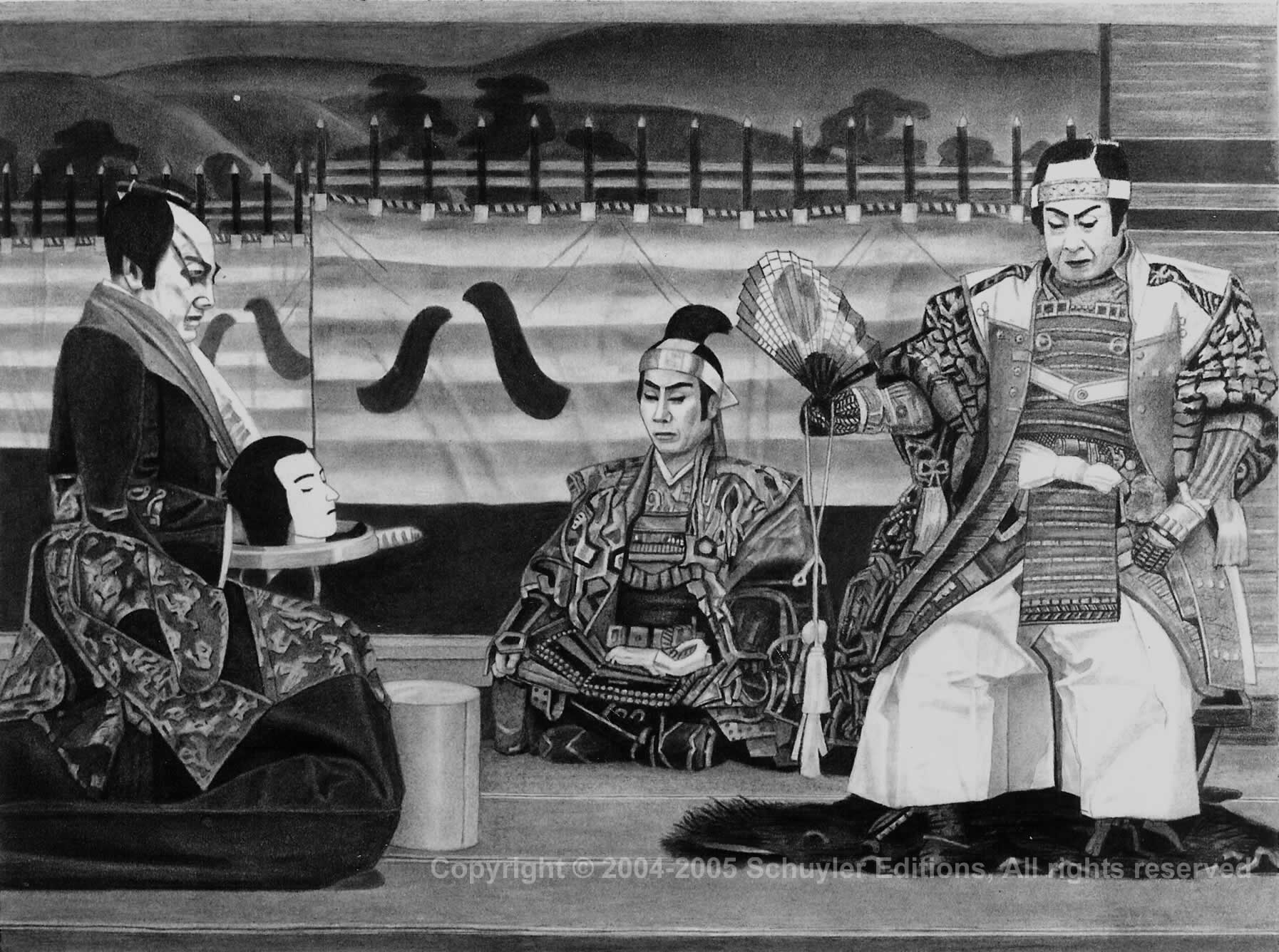
Kumagai Jinya
A Kabuki Play (Kumagai's Camp)
National Theatre, Tokyo, Japan
Kumagai Jinya is an emotional story of loves and loyalties, deceptions
and sacrifice among clans in the Edo past of present-day Japan.
Timing, measured sounds, subtle indications heighten the impact
of the tightly woven story. It is one of the most famous of Kabuki plays,
dramatizing the results of a confrontation between Genji General Kumagai
and Heike Warrior Atsumori in the epic "The Tale of the Heiki."
*
*
*
When Sagami was a lady of the Heike Court, she fell in love with
Kumagai,
a young officer from the Genji clan opposed by Heike. It was forbidden.
Facing death or expulsion, she appealed for help from her mistress, Fuji no
Kata,
who was a lady-in-waiting to the Emperor. She was desperate because she
was
pregnant with Kumagai's child. Fuji was sympathetic. She helped Sagami
and Kumagai to escape to western Japan and they promised their eternal
gratitude.
Fuji was pregnant also, with the Emperor's child. She soon married
Tsunemori,
the nephew of powerful lord Tiara Kiyomori. The child was brought up
as Tsunormi's son and was named Taira Atsumori.
*
*
*
Seventeen years later, in the winter of 1185, Kumagai intercepts a warrior
leaving the battlefield. It is the young lord Atsumori. Kumagai knows
Atsumori's
royal lineage and that it could be treasonous to kill him. He remembers
too, his
debt of gratitude to Atsumori's mother. Yet as a soldier it would be
dishonorable
for him to spare an enemy. He asks Atsumori if he has anything to say
before he is killed. Atsumori replies that he sorrows only for
his mother and wishes for death.
Kumagai's superior, General Yoshitsune knows of Kumagai's obligation to
Atsumori's mother. He understands the dilemma and offers Kumagai one
solution.
However, it must be kept secret in case Yorimoto, the supreme Genji
commander,
finds out, so he has a notice created and placed against a cherry tree
growing
in front of Kumagai's headquarters. Kumagai interprets the notice to mean
that he must offer the head of his own son to spare that of Atsumori.
*
*
*
Sagami has gone to Kumagai's headquarters to hear reports of her son
Kojiro's
first battle. She is amazed to find Fuji, whom she has not seen for sixteen
years.
Fuji has heard that Kumagai has killed her son, Atsumori, and she has come
to avenge him. Kumagai arrives. When she rushes at him he deflects her
sword,
then offers her his own. Fuji orders Sagami to remember her debt and kill
Kumagai.
Sagami, weeping, cannot. She asks her husband how could he kill
the son of Fuji who had befriended them.
In a special scene not always included, Kumagai relates details of the
tragic day to
Atsumori's mother and to his wife, Sagami. Fuji, no longer seeking
vengeance,
weeps for her son. Sagami attempts to comfort her.
*
*
*
General Yoshitsune arrives at Kumagai's headquarters to identify the head.
Both women are still present. Kumagai places the notice in front of the
General,
hoping to block the view to the two women. Slowly, Kumagai
lifts the head cover
and when Sagami cries out he quickly replaces it. Fuji then realizes it is
the head
of the son of Sagami and Kumagai, and not Atsumori.
Sagami, having just discovered that her son has been sacrificed, still must
show
the discipline and self sacrifice demanded by the samurai
code. She must maintain
her composure through unbearable pain. She must perform her role as required
though she is deep in grief.
Kumagai again removes the cover, keeping his eyes on his commander
partly because he cannot bear to see his son's face. Yoshitsune slowly
opens
his fan, looking through it at the head. Finally closing the fan, he says
quietly,
"You have done well. This is indeed the head of Atsumori."
Kumagai presents the head to Sagami to show to Fuji. Sagami caresses it
with loving hands and bravely pretends that it is Atsumori.
Fuji continues the deception.
*
*
*
The requirements of duty and honor have so destroyed Kumagai that he feels
he can no longer fulfill the responsibilities of command. All he wants
is to spend
the rest of his life praying for the release of his son's spirit.
Kumagai begs Yoshitsune to relieve him from service, saying he can
no longer pursue a military profession.
Yoshitsune, deep in grief also, grants his request.
He bids Kumagai to look once more on the face of his child.
In anguish, Kumagai cries out,
"Alas, the sixteen short years of his life have passed like the dew – like a
dream!"
As the curtain is drawn, Kumagai is alone.
He sinks down beneath the burden of his grief.

Back

